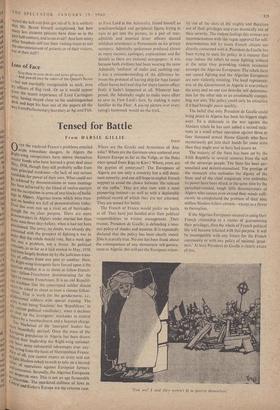Tensed for Battle
From DARSIE GILLIE Oacute immediate dangers. In Algiers the. ‘'Ett the weekend. France's problems entailed Right-vying conspirators have shown themselves master hands who have learned a great deal since Ma)', 1958, though they still probably suffer from their principal weakness—the lack of any serious candidate for power of their own. What could not be achieved by demonstrations or mass meetings has been arid the achieved by the blood of twelve martyrs occupation in arms of two blocks of build- ing' in Algiers. Algerian towns which were tran- quil on Sunday are full of demonstrations today. 'ran has even ryn up a rival set of barricades, though for no clear purpose. There are more demonstrators in Algiers under martial law than there is set tcir 031 say hat ibK) ing be trot not :di.
the ntY
a)i. Were three days before, when it had not been Proclaimed. The army, no doubt, was already dis- c°"tente4.1 with the prospect of fighting a war in order that the rebels should vote. But a week ago ,tilths was a problem, not a threat. Its political i,°",,eston, in so far as it had existed in May, 1958. f.4u been largely broken up by the judicious trans- tiers of officers from one post to another. Now. ,,le Right-wing insurgents have forced upon it the slliestion whether it is to shoot at fellow-French- nclen—fellow-Frenchmen demonstrating for the ,Ight to remain Frenchmen. It is an old Republi- da tradition that the conscripted soldier should (1,"er be asked to shoot at even a riotous fellow- „Ittzen. That is work for the gendarmerie, i.e., .'rofcssional soldiers with special training. The is not being 'fractious' but 'Republican,' in. t( le current political vocabulary, when it declines /1:lear up the 'insurgents' stockades in central -7_1,_"3.bY a bombardment and a bayonet charge. b "e blackniail of the 'insurgent' leaders has Eeen beautifully devised. Once the mass of the Pean population in Algeria has been drawn `inind their leadership the Right-wing national- hoe some substantial advantages Over any- e.4cting from the-basis of Metropolitan France. to ,t ” ali, you cannot expect an army sent out ,rides Moslem rebels to.wish to take on a second ;,lidles 'a operations against European farmers townsmen. Secondly, the Algerian Europeans io` desPerate men. This is not an age favourable
(
, °rities. The murdered- millions of Jews in n, ral and eaStern Europe are the extreme case. a)i.
[c's the are
eetl tht frr on'
anJ
39*
It ors [led the its net hat the the by list PARIS Where are the Greeks and Armenians of Ana- tolia? Where are the Germans once scattered over Eastern Europe as far as the. Volga, or the Poles once spread from Riga to Kiev? Where, even, are the gypsies of yesteryear? The Europeans of Algeria are not only a minority but a still domi- nant minority, and can still hope to exploit French support to avoid the choice between 'the suitcase or the coffin.' They are also men with a stout pioneering instinct—as well as with a deplorable political record of which they are not ashamed. They are tensed for battle.
The French of France would prefer no battle at all. They have just handed over their political responsibilities to trustee management. Their trustee, President de Gaulle, is defending a sinu- ous policy of shades and nuances. is repeatedly declared that the policy has been clearly stated. This is scarcely true. No one has been frank about the consequences of any democratic self-govern- ment in Algeria; this will put the European minor- ity out of the seats of the mighty and therefore out of their privileges and even drastically out of their security. The Violent feelings this arouses are incommensurate with the vague approval for self- determination felt by many French citizens not directly concerned with-it. President de. Gaulle has been trying, to state his policy in a manner that may induce the rebels to cease fighting without at the same time provoking violent resistance amongst the Algerian Europeans. The rebels have not ceased fighting and the Algerian Europeans are now violently resisting. The local representa- , tive of the Government in Algeria is everywhere the army and no one can describe self-determina- tion for the other side as an emotionally Compel- ling war aim. The policy could only be attractive if it had brought peace quickly.
The belief that only President de Gaulle could bring peace in Algeria has been his biggest single asset. To a stalemate in the war against the Moslem rebels he has now added a second stale- mate in a small urban operation against three or four thousand armed Home Guards who have mysteriously got into their hands far more arms than they ought ever to have had access to.
The majesty of the State has been set by the Fifth Republic at several removes from the will of the sovereign people. The State has been per- , sonalised and deinstitutionalised. The prestige of the monarch who embodies the dignity of the State and of the chief magistrate Who embodies its power have been struck at the same time by the parochial-minded, tough little demonstrators of Algiers who cannot even extend their minds suffi- ciently to comprehend the problem of their fine million Moslem fellow-citizens—except as a threat' to themselves.
If the Algerian Europeans succeed in using their French citizenship as a Means of guaranteeing their privileges, then the whole of French politiCal life will become infected with this purpose. It will be incompatible with any future for the French community or with any policy of national 'great- ness.' At least President de Gaulle is clearly aware Of this.
'You see? I said they weren't fit to govern themselves.'






































 Previous page
Previous page